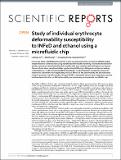Study of individual erythrocyte deformability susceptibility to INFeD and ethanol using a microfluidic chip
Author(s)
Liu, Lihong; Huang, Sha; Xu, Xiaoying; Han, Jongyoon
DownloadLiu-2016-Study of individual.pdf (1.334Mb)
OPEN_ACCESS_POLICY
Open Access Policy
Creative Commons Attribution-Noncommercial-Share Alike
Terms of use
Metadata
Show full item recordAbstract
Human red blood cells (RBCs) deformability in vitro was assessed during iron dextran (INFeD) loading and/or ethanol co-administration using microfluidic deformability screening. The results showed donor-specific variations in dose dependent deformability shift were revealed below 500 μg/mL iron dextran. Two out of nine blood samples exhibited significant cell stiffening at 500 μg/mL iron dextran loading concentration (p < 0.05, Tukey test). More interestingly, co-administration of moderate amount of ethanol was identified to have significant protective effects on RBC deformability. We also noted that ethanol can reverse the deformability of impaired RBCs. Meanwhile obvious donor dependent response to ethanol administration on RBC deformability was noted using our biomimetic microfluidic chip.
Date issued
2016-03Department
Massachusetts Institute of Technology. Department of Biological Engineering; Massachusetts Institute of Technology. Department of Electrical Engineering and Computer Science; Massachusetts Institute of Technology. Research Laboratory of ElectronicsJournal
Scientific Reports
Publisher
Nature Publishing Group
Citation
Liu, Lihong, Sha Huang, Xiaoying Xu, and Jongyoon Han. “Study of Individual Erythrocyte Deformability Susceptibility to INFeD and Ethanol Using a Microfluidic Chip.” Scientific Reports 6 (March 11, 2016): 22929. © 2016 Macmillan Publishers Limited
Version: Final published version
ISSN
2045-2322